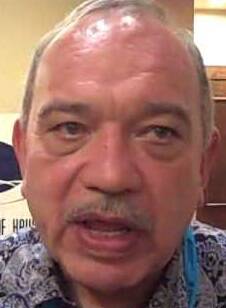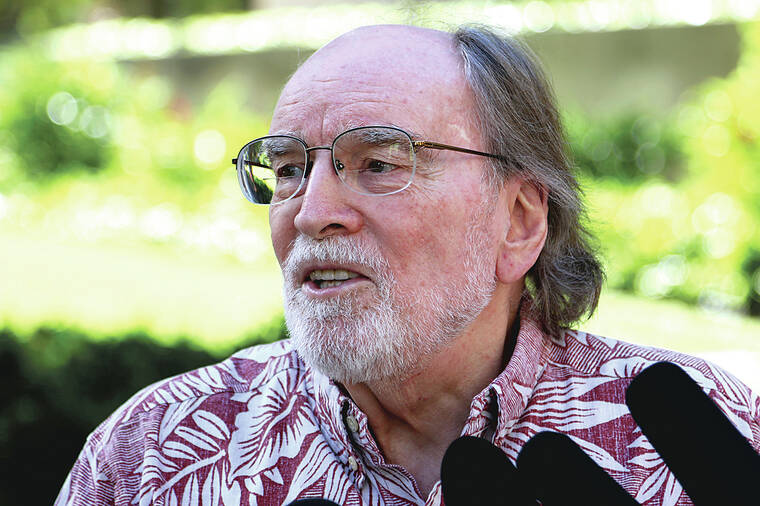Two of Hawaii’s former governors defended the statutory power assigned to the state’s chief executive to proclaim emergencies during public crises.
During an online livestream Friday, John Waihee and Neil Abercrombie, both Democrats, addressed the issue of proclamation fatigue experienced by some Hawaii citizens and legislators.
In his last emergency proclamation, Gov. David Ige delegated the bulk of emergency decision-making authority to the counties’ mayors. But that was after nearly two years of numerous proclamations and extensions issued during the state of emergency brought about by the novel coronavirus pandemic.
The Legislature introduced a bill during the last session that would have allowed lawmakers to curtail the governor’s emergency orders after a 60-day period, but that bill ultimately was killed. Some, however, have floated the possibility of revisiting the measure in the 2022 session, and Lt. Gov. Josh Green, a likely 2022 gubernatorial candidate, said in a recent interview he thinks the emergency proclamations have gone on too long.
Waihee, who served as governor from 1986 to 1994, said he thinks stripping the governor of emergency authority “would be a mistake” and amounts to “legislative interference with an executive function.”
“One of the … responsibilities of the governor is to deal with emergency situations,” Waihee said. “I don’t think you can deal with those kinds of situations by committee — which is what the Legislature, ultimately, is. … So, I think that would be bad policy. I think they’re playing up, in a sense, to the frustrations that people feel having gone through the pandemic and gone through this emergency situation.”
Waihee also defended Ige’s policy decisions during the pandemic.
“What proclamation, which proclamation, specifically, shouldn’t have been done?” he asked, rhetorically. “I mean, I can’t think of any. In fact, my criticism might be the other way around. Why did we wait so long to do some of it?”
Added Abercrombie, who served as the state’s chief executive from 2010 to 2014, “You have to have the emergency proclamation.”
“Look, you just got a new variant on … COVID-19 that just showed up in the islands in the last couple of days,” Abercrombie said. “The Legislature meets once a year. They’ve got two- or three-thousand bills that they have to deal with. There’s no way that the Legislature can substitute itself in any effective way for what needs to be done when you have emergencies that need to be addressed.”
Abercrombie used as an example the current crisis at Red Hill on Oahu, where a World War II-era Navy fuel storage facility with a history of leaks — including a Nov. 20 spill of 14,000 gallons of fuel and water — is being blamed for petroleum contamination of drinking water in the system used by thousands of military personnel and their families near Pearl Harbor.
The Navy said Thursday that tests had identified petroleum in its Red Hill well, which taps into an aquifer near the base.
“The Department of Health, in my judgment, should have shut down the Navy from putting fuel in those tanks, already,” Abercrombie said. “The Board of Water Supply needs to be able to act instantly. You can’t go to the Legislature and have Zoom meetings with people who, in the end, are going to have to go to the governor or to the mayor to implement administrative policies, anyway.
“It makes no sense at all. It should be shut down today. And the facilities, to the degree that fuel has to be stored, should be put elsewhere.”
Abercrombie, a former congressman, said that as a member of the U.S. House Armed Services Committee, he inspected the tanks at the Red Hill fuel farm.
“I can tell you for a fact … the aquifer is completely vulnerable to an earthquake. We’re one earthquake away from having the water for the island of Oahu and everybody on it destroyed. It makes no sense. It should be shut down today.”
Asked about Red Hill, Waihee replied, “I’m with Neil on that.”
“The military always takes the position that they can’t do without something,” he said. “They can’t do without it. … They couldn’t do without Kahoolawe. They couldn’t do without (the former Naval Air Station) Barbers Point. They couldn’t do without any of those things and, yet, they have done without it.
“… So, yeah, we ought to close the place down. I mean, how much more do you need to do to demonstrate that those facilities are no longer viable, period?”
The Associated Press contributed to this story.
Email John Burnett at jburnett@hawaiitribune-herald.com.









